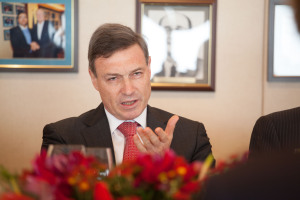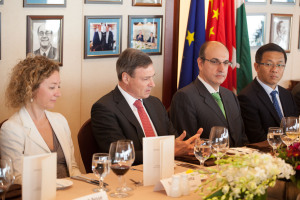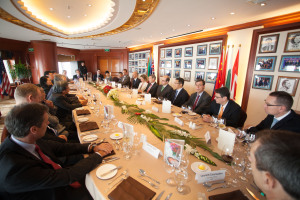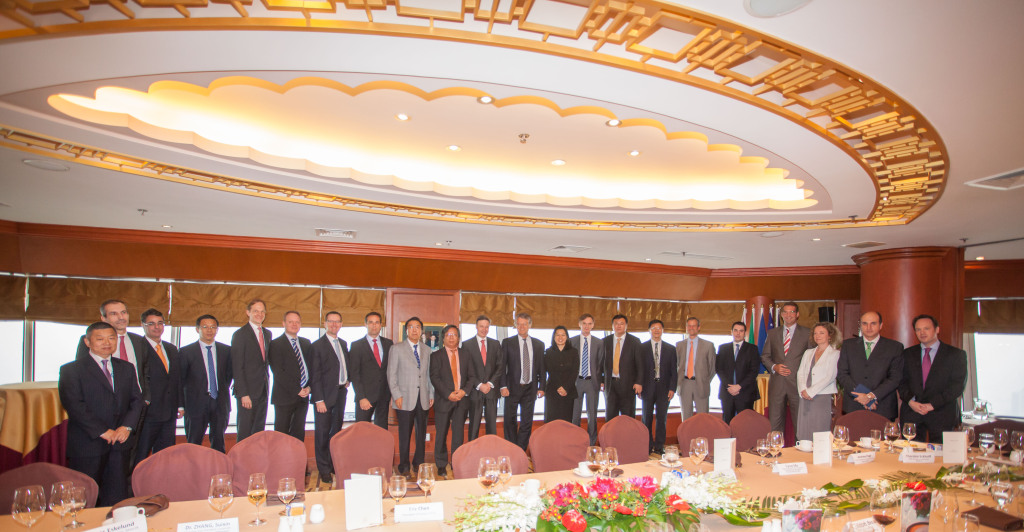In this exclusive interview the new Ambassador of the European Union to the People’s Republic of China and Mongolia, HE Hans Dietmar Schweisgut, speaks to EURObiz about EU-China relations, the 4th Plenum Decision, IPR, urbanisation and the importance of EU Member States saying the same thing.
You were previously posted to China and a lot has changed since then, what changes do you find most striking?
I left Tokyo at the end of my previous posting as Austrian ambassador in 2007, a year before the Beijing Olympics. China’s further development since then has been impressive. It is not so much the new buildings and the infrastructure which I find striking, it is more the awareness that China has become not only an economic giant but also a global political power. At the same time you can feel that the present growth model is no longer suitable for a mature economy. Traffic congestion and pollution in Beijing have reached unsustainable levels. So, in a nutshell, what I find the most striking change are the enormous challenges which are the result of China’s phenomenal economic growth and which were not quite as visible a few years ago as they are today.
 What are the goals that you wish to accomplish during your tenure?
What are the goals that you wish to accomplish during your tenure?
I hope to be able to contribute to further enhance relations between the EU and China. These have intensified in a way that they now really merit the label of a comprehensive strategic partnership. At the last Summit meeting we agreed on a Strategic Agenda 2020 – a blueprint for cooperation in trade, transport, urbanisation, green growth, energy security, food safety, agriculture, but also with regard to migration, foreign and security policy as well as security, rule of law and human rights. The challenge will be to focus on the right priorities and ensure that we will be able to achieve practical results. I hope that next year’s 40th anniversary of EU-China diplomatic ties will provide the opportunity to push in this direction. An early EU-China Summit with the new EU leadership would be an occasion to drive this ambitious agenda forward.
In the trade and investment area, we should build on the successes of this year, where we have resolved frictions through amicable discussions and negotiation. It is important to ensure trade is a two-way street, where our companies enjoy a level playing field, ample market access, full IPR protection and equal treatment cemented in the rule of law. This allows us to keep a positive agenda, reflecting the essential advantages of our deeply interdependent relationship. The main focus of this positive agenda is the negotiation of an ambitious investment agreement, which is progressing apace.
 How would you describe relations between EU institutions and the European Chamber?
How would you describe relations between EU institutions and the European Chamber?
The European Chamber has become a very powerful institution with about 1,800 member companies in China. It now is truly ‘the voice’ of European business. The EU Delegation strongly supported the creation of the Chamber when China was about to join the WTO and we consider it as a natural partner with whom we closely cooperate.
The Chamber’s yearly position papers have become important inputs into policy-making, and the last one, which was published in September, was particularly relevant as it focussed very much on the importance of translating the decisions of last year’s Third Plenum into concrete market-opening and a level playing field.
I look forward to the Chamber’s continued input into our policy-making and action. Aside from market-access issues, the Chamber’s contribution to the investment agreement negotiations will be of the utmost value. The EU Delegation will continue to support the Chamber’s excellent work in Beijing and throughout the country.
How does the EU perceive China’s reform drive, and what are you views on the outcome of the CPC 4th Plenum?
The reform drive is as ambitious as it is necessary for China to become an innovative, sustainable, socially-inclusive, high-income economy. A more decisive role of the market and the further opening-up of the economy will also help European companies, but they are above all in China’s own interest. We are ready to support these reforms.
In implementing the reforms announced at the Third Plenum, the decisions taken at the Fourth Plenum of the CPC, which was held at the end of October, were of great importance. A mature society and economy can only function within a predictable, impartial and non-discriminatory legal framework – something which we call the rule of law. It is too early to assess the full scale of the legal reforms envisaged. The extent to which China’s Constitution was emphasised as the supreme law of the country was certainly noteworthy.
From a European perspective, a predictable and non-discriminatory atmosphere for foreign business is of the essence. There is no better message that can be passed in this context than the importance of the rule of law. We welcome the attention the Fourth Plenum has paid to this issue and see elements of progress we can build on. Implementation, again, will be crucial, and we stand ready to share our extensive experience with China in this regard.
How important are the EU-China Bilateral Investment Agreement negotiations in the EU trade agenda and what concrete outcome do you foresee for EU companies?
The EU-China investment negotiation is the ‘flagship project’ of our trade relationship. The untapped potential in the area of two-way investment is simply immense.
This is why both the EU and China attach great importance to these negotiations. Our level of ambition is high. To start with, the agreement would ensure the highest level of investment protection, no matter which EU Member State this investment originates in (or, for Chinese companies, to which Member State the investment is directed). And, crucially, it would cover market access for our investments, eliminating many of the uncertainties and barriers our investors face today. As I have said, negotiations are progressing apace, and comprehensive discussions will take place in the upcoming fourth round of talks. The stakes are of the highest order for EU business, and we welcome the Chamber’s input throughout these negotiations so we can maximise the benefit for our companies.
How do you characterise China’s action in the WTO context?
WTO work may seem remote to many companies, but it remains the central mechanism to ensure markets are more and more open across the world. WTO accession provided a fundamental boost to China’s openness, and was at the centre of China’s remarkable economic success. Another round of ambitious opening would be fundamental for the success of China’s reforms, as acknowledged by the Third Plenum.
We welcome China’s increased and constructive action in trying to shape global trade rules in the WTO, but equally look forward to an engagement in favour of liberalisation that is commensurate with China’s global stature. This leadership will be important to tackle the remaining issues in the Doha Round, and to advance in the many areas of plurilateral work (extension of the information technology agreement by the end of this year, green goods agreement, definition of rules on export credits). We have also supported China’s willingness to enter into negotiations of a plurilateral agreement on services.
Partners are looking for unequivocal signals that China is ready to exercise that leadership. An important signal would be a credible, comprehensive revised offer to enter into the Government Procurement Agreement, which China already committed to join at the time of its accession to the WTO in 2001. China’s full implementation of its commitments is necessary for the credibility of the WTO system as a whole.
Are there any new initiatives being introduced that will help protect IPR in China?
While China has made significant efforts in recent years to improve its IPR legal framework, it remains the main country of origin of goods suspected of infringing IPR. In 2013, 65 per cent of all counterfeit goods seized at European borders came from China.
Since 2004, the EU and China have established an IP Regulatory Dialogue. Moreover, we are currently negotiating various agreements with an IPR angle, for example the Agreement to Protect Geographical Indications; Investment Agreement.
In 2014, the EU has launched two new initiatives: the EU-China Action Plan on IPR customs enforcement and the technical cooperation project named IP-Key for Sustainable Competitiveness. The latter is a EUR 7.5 million project, co-financed and implemented by the EU Agency for Trademarks and Designs. It aims at supporting European innovators and rights holders dealing with China through the development of an IP framework or environment in China that is increasingly effective, fair, transparent and otherwise based upon international best practices.
Could you share with us your views about China’s ambitious urbanisation process and your expectations for the EU-China Urbanisation Partnership?
Due to the impressive scale of internal migration, urbanisation in China poses quite unique challenges in all fields, from transport to energy, to water management or housing. It is crucial for China to embrace a sustainable model of urbanisation, and the decisions made today will be fundamental for the decades to come. The adoption of the National New-type Urbanisation Plan earlier this year demonstrates that the Chinese leadership is aware of this challenge and is working on identifying the best approach.
We believe the EU has the necessary expertise and technologies to support this transition towards sustainable urbanisation and we are willing to help to provide them to the right actors in China. But we are aware of the difficulty of this process; conditions in Europe and in China are extremely different and any expertise or technology, to be really useful, will need a process of adaptation. The role of the Urbanisation Partnership is, precisely, to help in this difficult process.
It seems that many in Europe feel that the ‘challenge’ from China to the European economy is now far less than in the first half of the decade following China’s accession to the WTO. Europe then clearly became very introspective during the financial crisis and it is now looking more toward the US and the perceived ‘energy threat’ stemming from cheap shell gas in the US. How will you ensure that China gets the right kind of attention in Europe?
A multipolar world with numerous political and economic challenges will always have various focal points of attention. China will invariably be one of the most important partners for us.
I already explained the depth and breadth of our relations and the size of our economic interaction. We also see each other as important partners to safeguard peace and security. I therefore see little risk that China is not getting the right attention in Europe.
The new leadership in Europe has a unique chance to further boost this essential relationship, and next year’s 40th anniversary of diplomatic relations will provide a great opportunity towards this end.
The European Chamber is the voice of the European business community in China. Yet, when it comes to diplomatic relations with China, there are as many voices as European countries. Do you have a plan to ensure Europe speaks with one voice?
The important thing is not so much that we speak with one voice; the important thing is that we say the same thing. The European Union is not a super state but a union of 28 democratic countries. Many important areas of our external relations are the exclusive competence of the EU, trade policy being the most prominent example, and the Treaty of Lisbon has further enhanced the scope of the EU’s competences.
I feel that divergences between Member States are often exaggerated. We all know that no single European country counts among the big ones in today’s world. Only a united Europe has the weight and the influence to protect our interests. All our major positions with regard to strategic partners such as China have been agreed by all Member States. All support the strategic direction of this policy, including the objectives of the Agenda 2020. Let me also add that we have excellent EU coordination among ambassadors here in Beijing. I am quite confident that this shared interest in projecting unity in the interest of everyone will become more visible as we deepen the network of our relations with China.





Recent Comments